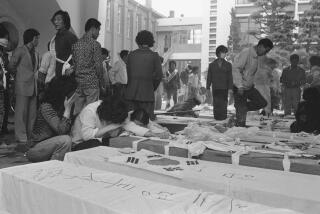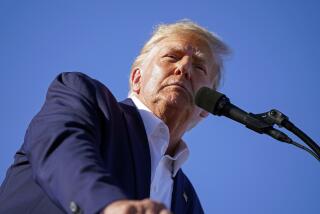2 Ex-Leaders on Trial in S. Korea Deny Sedition
TOKYO — In a trial reopening one of the most traumatic chapters in South Korea’s history, former Presidents Chun Doo Hwan and Roh Tae Woo today denied charges of sedition in a 1979 mutiny that led to a bloody civilian massacre.
Attorneys for the two men argued that the arrest of the army’s then-chief of staff, Chung Seung Hwa, on Dec. 12, 1979, was a step necessary for the investigation of President Park Chung Hee’s assassination two months earlier.
The historic trial starting today to “right the wrongs of history,” as President Kim Young Sam has declared, marks the first time two former presidents have appeared in court together. Seated side by side in the courtroom dressed in prison garb, Roh and Chun briefly clasped hands. Roh, appearing flustered, misstated his address twice. Chun appeared calm.
Hundreds of riot police ringed the courtroom, and several protesters screaming insults and demanding heavy punishment for the former leaders were led away.
At one point, the father of a student leader beaten to death by riot police in 1991 stood and cursed the two, saying, “We should execute them!” A fistfight ensued between the man and others watching the trial, and Roh and Chun were quickly ushered out of the courtroom, according to Associated Press.
Chun and Roh, former generals who also face separate charges of political corruption, could receive the death penalty if convicted of sedition in leading the mutiny, killing superiors and sentries, injuring superiors, deserting assigned posts and illegally moving troops.
Fourteen other defendants appeared today before a three-judge panel probing the mutiny, the first in a bloody chain of events that launched Chun and Roh on their paths to power. Five months after Chun grabbed power in the mutiny, he declared martial law. The next day--May 18, 1980--troops began their crackdown in the southwestern city of Kwanju to suppress burgeoning civilian protests against the military regime.
The suppression ended with at least 200 people dead. Left unprobed for more than a decade, the Kwangju event served as a tragic symbol of South Korea’s darkest era of military brutality and the injustice that people of Chollanam province have long felt at the hands of the nation’s rulers.
But last year, Kim stunned the nation by announcing that he would open an investigation into the event, overturning an earlier decision to leave the judgment to history. And in December, the National Assembly passed a special law lifting the 15-year statute of limitations on prosecuting the two former presidents and their military cronies.
Earlier, the defendants challenged the retroactive law as illegal, but their challenge was rejected by the nation’s constitutional court. They continue to maintain that the sedition charges are unconstitutional because prosecutors had earlier decided they had no legal grounds to indict and suspended the case.
In today’s hearing, attorneys for the two men also rebutted charges that the Chun and Roh governments were not legitimate, arguing that they had been recognized by every nation in the world and that various treaties and laws adopted by them are still in effect today.
Although Chun and Roh face the possibility of execution, most Koreans believe that the two will receive special presidential pardons if convicted. Initial questioning will continue on the next two Mondays, but cross-examination is expected to be delayed until Chun’s slush fund trial is completed April 15.
Chun, 65, has admitted taking $290 million from more than 40 business executives during his 1980-88 presidential tenure. Roh, 63, is accused of taking about $370 million from 35 business tycoons during his 1988-93 term.
Both men have denied the money was bribes, however, calling it “political donations,” and said they used the money to help other politicians. But they have refused to confirm the donors or recipients.
Chun staged a 27-day hunger strike in prison that landed him in a national police hospital before he was sent back to prison March 2.
Chi Jung Nam of The Times’ Seoul Bureau contributed to this report.
More to Read
Sign up for Essential California
The most important California stories and recommendations in your inbox every morning.
You may occasionally receive promotional content from the Los Angeles Times.











